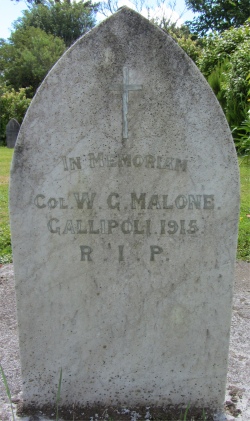
Colonel Malone Memorial
|
Another bright start to the day again, and a clear view of Mount Taranaki was to be had. I met the Dutch lady in the communal kitchen, who said she and her husband were planning to do some walking on the north side of the Egmont National Park today, and perhaps spend some time in New Plymouth. We wished each other Merry Christmas and bon voyage, and went our separate ways.
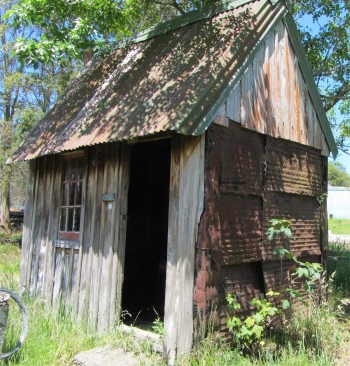
A Whare
|
I drove out of town a short distance to Taranaki Pioneer Village. Here a collection of forty buildings on a ten acre site depicted early life in Taranaki. All the buildings were original, and just lifted and shifted to the site. In a way it is a similar principle to the Beamish Museum in the north east of England, except here they don't employ people to act out character parts in the village.
The buildings included: two schools, two train stations, a church, bank, hospital, fire station, and numerous business and residential premises. Many dated from the transition of the 19th - 20th-century. I noticed almost all of them had corrugated iron roofs; golly that must have been fun in a rainstorm.
I ambled around in no particular hurry, browsing through the structures and soaking up the memories of yesteryear. Text gave accounts of the residents of houses and cottages, and of some of the business people too, all adding to the character of the establishment.
I came across a whare on my tour. To me, it resembled a workman's hut. I had not come across the word before, so on my way out I asked the lady on the reception desk for a definition of a whare. I was lost in seconds as she rattled on at machine gun speed about a "forry", which went straight over my head. "What's a forry?" I asked. "That's the Maori pronunciation," she replied, "I had never heard of it until I started working here," she added. "It must be European," she continued, "since if it was a Maori building, it would have carvings on the outside." She racked her brains for a more accurate definition, and I could tell she was guessing, and the more she guessed the more she carried on. The words hole, stop and digging sprung to mind. "It's not important," I said, which made the poor woman even more flustered. Then a brainwave, she played around at a keyboard and triumphantly came back with an answer, "It is a workman's hut and dwelling place." Then she noted the screen quoted the wrong dates for the Depression. I did not want to go down that route. During those Depression years, 44-gallon tar barrels were cut and straightened and used to build such whares.
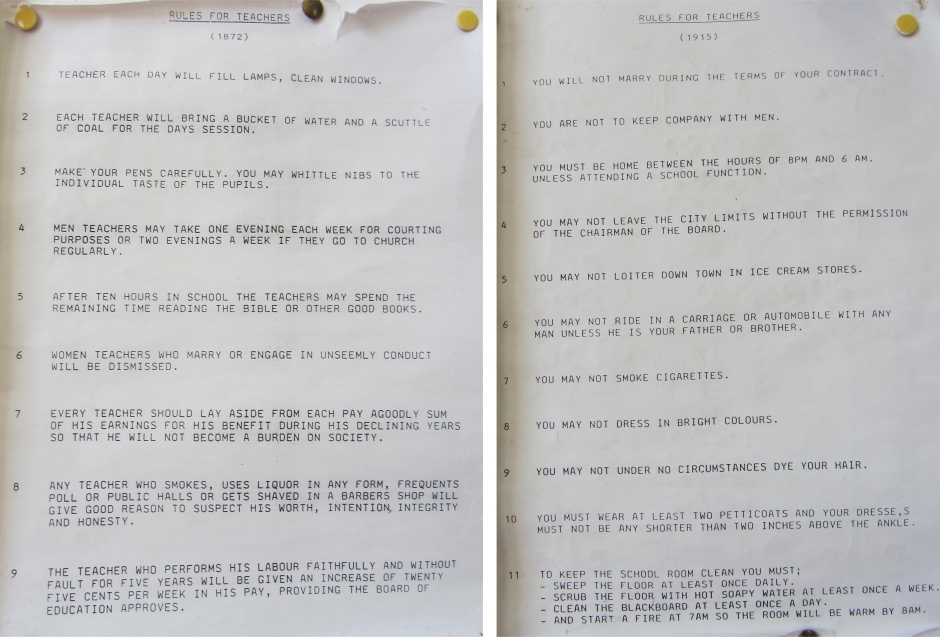
Teachers Had it Tough in Those Days
|
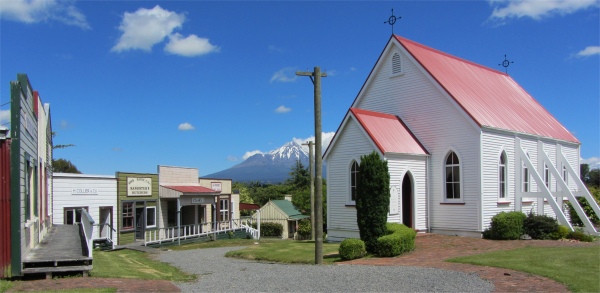
Another Street in the Village
|
Jed, the odd job man was dragged into the conversation, rather reluctantly I figured by the way his eyes rolled up into the top of his head. He said that down south, where ever that is defined, the huts were called "waare"; his pronunciation of the word. I will never be any the wiser on that one. We got into a philosophical conversation about corrugated iron roofs. Why can't I just keep my mouth shut at times? I eventually managed to extricate myself, wishing them a Happy Christmas. I had caused the poor woman enough excitement for the day.
I then drove west, skirting the south end of Egmont National Park. Mount Taranaki idly posed there in all its glory, and of course today, was not shrouded in mist. Some you win and some you lose I guess. It was a good long drive through agricultural land, with fields full of cattle or sheep, and some being harvested for hay. There was hardly any village of significance on the route, yes, there is plenty of space out here. Soon I found myself dropping down to the coast at Opunake which straddled Surf Highway 45.
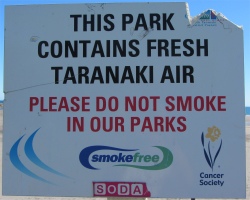
Taranaki Smoke Free Zone
|
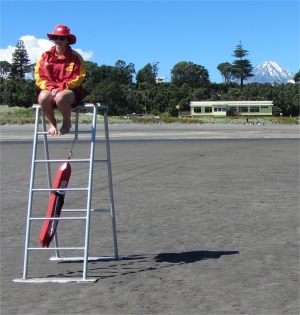
Opunake Lifeguard
|
Opunake was a sleepy wee town, and like most wee towns down here, just one main drag and then residential roads on either side. I headed down to the beach to book a place on the campsite, a brand new complex with ample of everything. I parked up to a couple of San Franciscans. They were doing a whistle-stop tour, with less than two weeks left in which to cover the South Island. "Wow, that's going to be hard going," I said. The chap was 50 years old, a pile-driver by trade, and was hoping to hang on until 55, when he will pick up a pension. "Are you certain you'll have one in five years?" I asked. "I belong to a good Labour Union," he replied, "and they have a lot of clout." I certainly hope so.
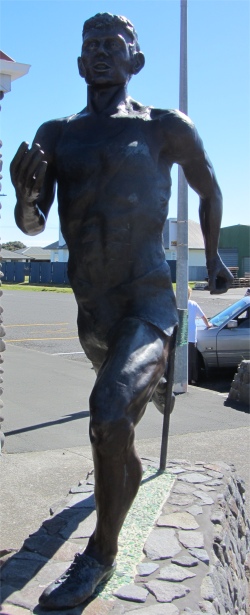
Peter Snell
|
I took a stroll down to the beach, a magnificent sweep of sands, with small waves breaking and lapping the shore in the distance. I walked the stretch to where the flags were flying, with a lifeguard perched on a high-chair. "Although this is a surfer's paradise," she said, "the waves are a foot high today, so they are taking a day off." I walked the breadth of the bay, gazing out at the turquoise sea, and the waves gently lapping around my feet. The water was crystal clear.
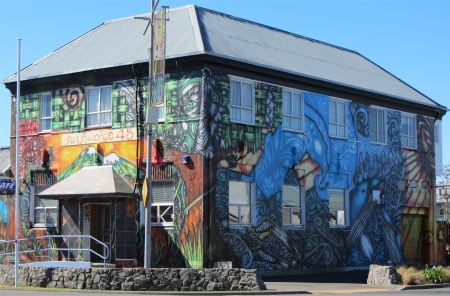
The Old Bank Building
|
I soon got bored with the beach and headed up to town to explore. Five minutes was enough. The numerous murals on the walls reminded me of the Mission District in San Francisco. I passed a statue of Peter Snell and took a photo. Snell was born in Opunake in 1938, and was regarded as one of the greatest athletes of all time and New Zealand's Sports Champion of the 20th-century. In the 1960s he won three Olympic Gold Medals for 800m and 1500m and two Commonwealth Games Gold Medals for the mile and 880 yards track events. He set seven individual world records during his athletic career, including twice setting a new mark for the mile distance. He was also a member of the New Zealand quartet that broke the world 4x1 mile relay record.
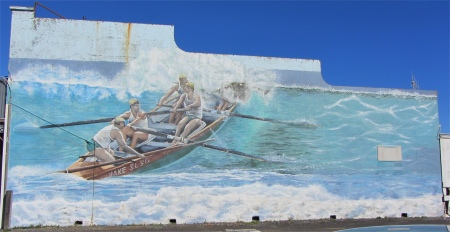
The Boat Mural
|
An elderly chap passed by, and told me that he was coming to take the flag down, pointing to one flying close to where I stood. "I put it up every day, the New Zealand flag. Sometimes I put the American flag, or the Union Jack, the Anzac flag, and whatever flag suits the occasion," he said. That seemed to be Ian's mission in life. I soon learned that he had a military background, and he told me that when he tried to enlist for the Second World War, he was sent home with the words, "Go and get your nappy changed!". He was extremely insulted by that. He did eventually serve in the army but never saw any active service.
"If it wasn't for the Australians, the Japs would have invaded us. Me and my brother saw two Jap submarines off the coast here, and we found the remains of some of their campfires by the shore. But the authorities wouldn't listen," he told me. "The Germans attacked up near Auckland," he added. "Yes, I read about that when I explored Devonport and North Head," I said. "I was based there for a while, on the Boffers gun," he added.
Then his wife Connie appeared. I soon learned that Ian was now 80, and had moved from New Plymouth to Opunake in 1934. "I hope he's not boring you with his war stories," laughed Connie. "Not at all," I smiled. The couple had seven children, sixteen grandchildren, and were now great grandparents. Connie thrived on it, but Ian was referred to as Mr Grumpy by the grandchildren. Ian and Connie engaged in friendly bickering. She wanted to have picnics by the beach, Ian didn't see the point. She wanted to urge him on to buy cat food, Ian was content to stand with his hands in his pockets and dredge up other old memories. I found it quite amusing, and we all had a laugh about it. It took 20 minutes to galvanise Ian into action. We wished each other Merry Christmas, and they crossed the road, Ian being more or less dragged, to the food store. The flag was still flying.
While I was tucking in to my evening meal, I got chatting to an ex-South African. He had moved to New Zealand three years ago, and was living in Auckland. "You're a JAFA, are you?" which is the sort of thing a Kiwi would say, expecting some wisecrack back. The poor guy didn't know what I was talking about, so I had to explain, then he saw the funny side, fortunately. He told me there is an equivalent for South Africans; SAFA. South Africa was not a good place to live anymore. One quarter of the population is HIV positive, fatal car accident figures keep rising, as does the crime rate. He had tried to move to Australia but was 25 points short of the minimum requirement. He managed to scrape into New Zealand. New Zealanders are hard to please; if you start flashing all sorts of fancy qualifications at them, you go down in their estimation. He had to play down his two degrees. "One mustn't rise above one's level in society" is the norm. He found the Auckland pace too fast, but he will grin and bear it until his children are educated, then he'll move out into the country. He considered his children would receive a far better education in the city, he hadn't a good word to say about countryside schools. Knowing virtually nothing of the educational system in this country, I couldn't comment.

